If you have a new tattoo, it’s important to take the right steps to protect it and make sure it doesn’t get damaged in the water. Waterproofing your swimming tattoo will help keep it looking vibrant and beautiful for years to come. In this article, we discuss how to waterproof a tattoo when swimming, what products to use, and the answers to some of the most frequently asked questions about swimming tattoos.
Why Can’t You Swim With a Tattoo?
When you get a new tattoo, the skin around it is still healing and repairing itself. During this time, swimming in water can cause damage to your new ink. Pool water contains chlorine which is very harsh and can strip away at the fresh layers of your skin, leaving the colors of your tattoo faded and dull. Saltwater from oceans or lakes can also cause severe damage, so it’s important to protect your swimming tattoo when you’re in the water. [2]
How Long Before You Can Swim With a New Tattoo?
In addition, it’s important to make sure that the tattoo is properly covered with waterproof sunscreen before you go swimming. This will help protect the artwork from fading due to UV exposure and prevent the ink from running when submerged in water. [2]
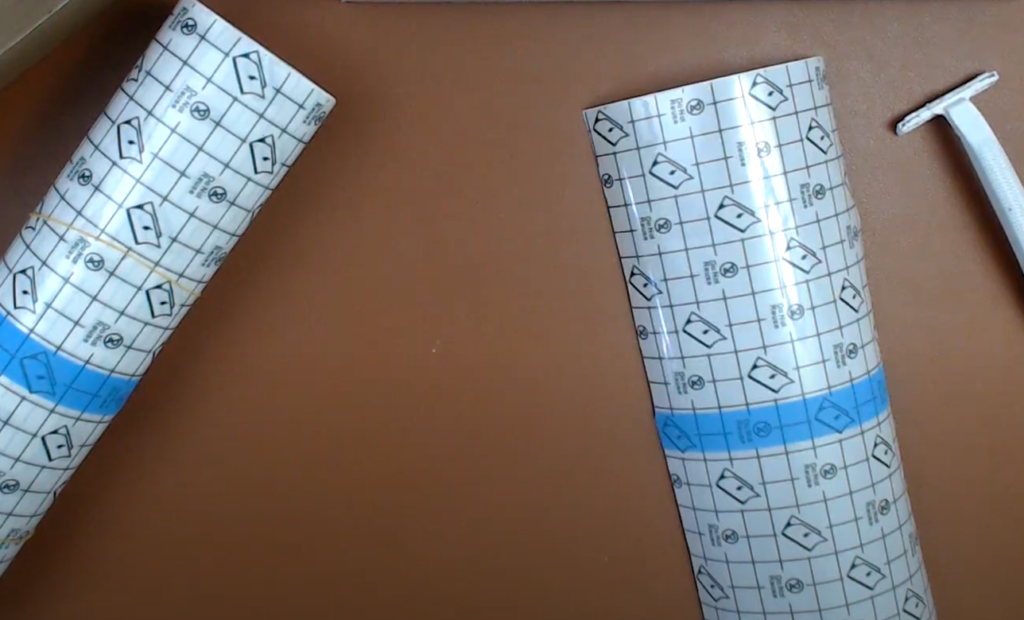
Why Is It So Important to Wait?
Risk of Infection
Waiting is one of the most important steps in protecting your tattoo while swimming. You need to wait until your tattoo has completely healed before going into a pool or ocean—this can take anywhere from two weeks to six months, depending on the size and complexity of the tattoo. During this time, it’s essential that you keep your tattoo clean and well-moisturized. If you jump into a swimming pool or ocean before your tattoo is fully healed, there’s an increased risk of infection. Bacteria, viruses, and fungi that thrive in water can find their way deep under the skin and cause problems like swelling, redness, and pain. So take care to wait until your tattoo is fully healed before taking a dip. [1]
Damage to Your Tattoo
Skin Irritation
Another reason why it’s so important to wait for your tattoo to heal before swimming is that even with the extra protection of a waterproof ointment, the pool chemicals can still cause skin irritation. This is especially true in the case of chlorine pools, which are known to strip away natural oils from the skin – oils that help protect your tattoo. This can cause uncomfortable itching and rashes, as well as discoloration of the ink. To reduce the risk of this happening, try to limit your time in chlorinated pools and consider investing in a saltwater pool instead. [1]
How to Tell if Your Tattoo Has Fully Healed?
It is very important that your tattoo is fully healed before you expose it to water. This will not only help protect your design from damage but also reduce the risk of infection.
The amount of time it takes for a tattoo to heal varies from person to person, depending on the size and complexity of the design. Generally speaking, a healing tattoo should be free of scabs and redness, and no longer tender to the touch.
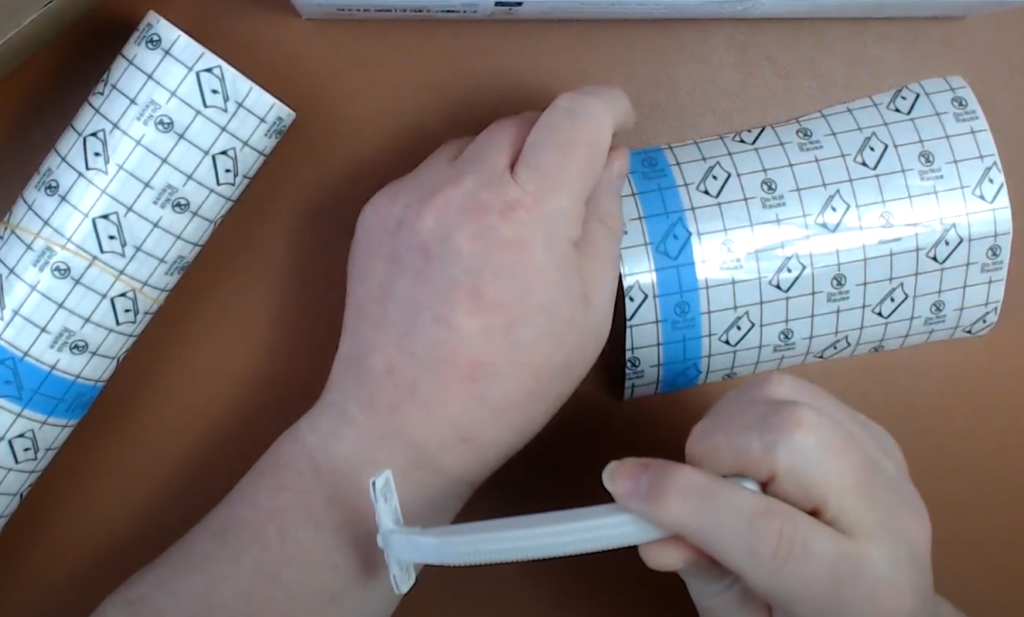
It’s also worth mentioning that it can take up to two months for a tattoo to fully heal. If you’re planning a swimming trip and your tattoo isn’t quite healed yet, you may want to wait before taking a dip. [1]
If You Have to Swim:
Apply a Waterproof Dressing
If you must go swimming, then it’s important to take the necessary steps to protect your tattoo. The best way is to apply a waterproof dressing. These are available in most stores and online, and they will help keep out moisture, salt water, and chlorine while allowing some airflow so that your skin can breathe.
When applying the waterproof dressing, ensure that you cover the entire tattoo. This will include any areas such as creases and bends in your skin where water can pool. After applying it, ensure that there are no air bubbles or gaps between the dressing and your skin for maximum protection. [1]
Clean the Tattoo as Soon as You’re Done
After you’re done swimming, it’s important to clean the tattoo as soon as you can. You should use a mild cleanser or soap and warm water, then pat or squeeze dry with a clean towel. Do not rub your skin when drying off; this could damage your tattoo and cause irritation. After cleaning and drying, apply a thin layer of lotion or ointment to keep the skin moisturized. [1]
Wrap The Tattoo In Plastic Wrap
If you’re going to be in the water for an extended period of time, then it’s a good idea to wrap your tattoo in plastic wrap. This will help keep out moisture and chlorine while still allowing airflow.
When wrapping your tattoo, ensure that you apply the wrap tightly so that no air can get in. The goal is to make sure that the wrap is snug but not too tight, as this can cause irritation or damage. It’s also important to avoid wrapping too loosely, as this won’t keep out water. [3]
Remember that when done swimming and removing the wrap, always clean and moisturize your tattoo afterward.

Seal The Plastic With A Medical Sealant
For extra protection, you can seal the plastic wrap with a medical sealant before swimming. This will further ensure that no water or chlorine gets inside the wrap, and keep your tattoo safe from potential damage.
Medical sealants are available in most stores and online, so make sure to pick one up before heading out for a swim. Always follow the instructions on the label for the best results.
Finally, it’s important to remember that you should never swim with a freshly-done tattoo until your artist has cleared you to do so. This can vary from person to person and depends on the size and complexity of your tattoo, so always ask your artist first before taking a dip. [3]
Safer Alternatives to Using Vaseline
Vaseline and petroleum jelly are popular choices for protecting tattoos from water, but there are safer alternatives available. For example, you can use a thin layer of non-scented lotion or ointment that is specifically designed to protect tattoos from the water. These products will provide better protection while still allowing your skin to breathe.
Additionally, if you’re looking for an even more natural alternative, then you can make your own waterproofing solution with beeswax and vitamin E oil. Mix the two ingredients together in equal parts until it forms a thick paste and apply it to your tattoo before swimming. [3]
Be Careful With Your Tattoo Immediately After Your Swim
As mentioned above, always ensure that you clean and moisturize your tattoo as soon as possible after swimming. This is especially important if you have to go into the water with an unprotected tattoo, as it may be more vulnerable to damage.
Additionally, be careful while drying off your tattoo. Do not rub or scrub when using a towel; pat or squeeze dry instead. This will help keep your tattoo looking as vibrant as possible and prevent any irritation or damage that could occur from vigorous rubbing. [3]
If You Already Went Swimming
If you went swimming with a new tattoo and didn’t take the necessary precautions, don’t panic — you can still take steps to protect your skin:
- First, make sure to thoroughly wash and dry off your tattoo when you get out of the water;
- Then, apply a layer of antibiotic ointment or healing balm to the area. This will help to keep it moisturized and prevent infection;
- Finally, cover the tattoo with a waterproof bandage or plastic wrap until you can get to your doctor or dermatologist for further care instructions; [1]
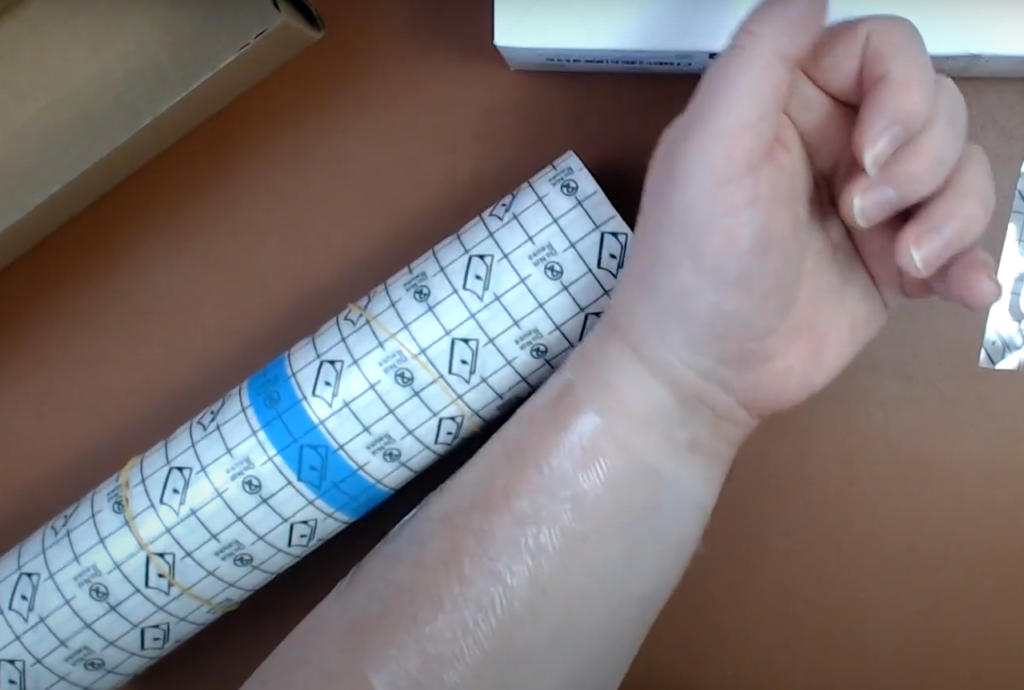
Tattoo Care Tips for Swimmers
Swimming with a new tattoo can be a bit of an intimidating experience. After all, tattoos are delicate works of art and you want to make sure that your skin stays healthy and your artwork looks great. Luckily, there are some simple steps you can take to waterproof your tattoo so you can enjoy swimming without worrying about damaging it. [2]
How Do I Shower With A New Tattoo?
It’s important to take extra care when showering with a new tattoo. Unlike swimming, you don’t need to worry much about your tattoo getting wet while you shower. But there are some precautions that should be taken.
First off, keep the water lukewarm: hot water can irritate and dry out your skin, which can slow down the healing process and even cause infection. Don’t use any soap directly on your tattoo; instead, use mild, antibacterial soap to clean around your tattoo. Gently pat the area dry with a clean towel after each shower. Resist the urge to scrub or rub your skin; you don’t want to cause any damage to the new ink.
If you’re worried about the water getting into your tattoo, you can always cover it with a waterproof bandage or plastic wrap while you shower. Once you’ve finished showering, make sure that you remove the covering and dry off your skin as described above. [2]
Can I Take A Bath?
If you’re considering taking a bath, it’s important to remember that any water exposure can put your tattoo at risk. When the water is too hot or overly chlorinated, it can cause serious damage to your delicate ink and could ruin the look of your tattoo. If you must take a bath, make sure that the temperature isn’t too hot and that there are no harsh chemicals present in the water.
If you’re looking to relax after a long day, it’s best to opt for a warm shower instead of a bath. When taking a shower, avoid using an abrasive scrubber or loofah on your tattooed skin as this can cause irritation and further damage your tattoo. Additionally, you should use a gentle body wash or soap to keep your tattoo away from any harsh chemicals. [2]
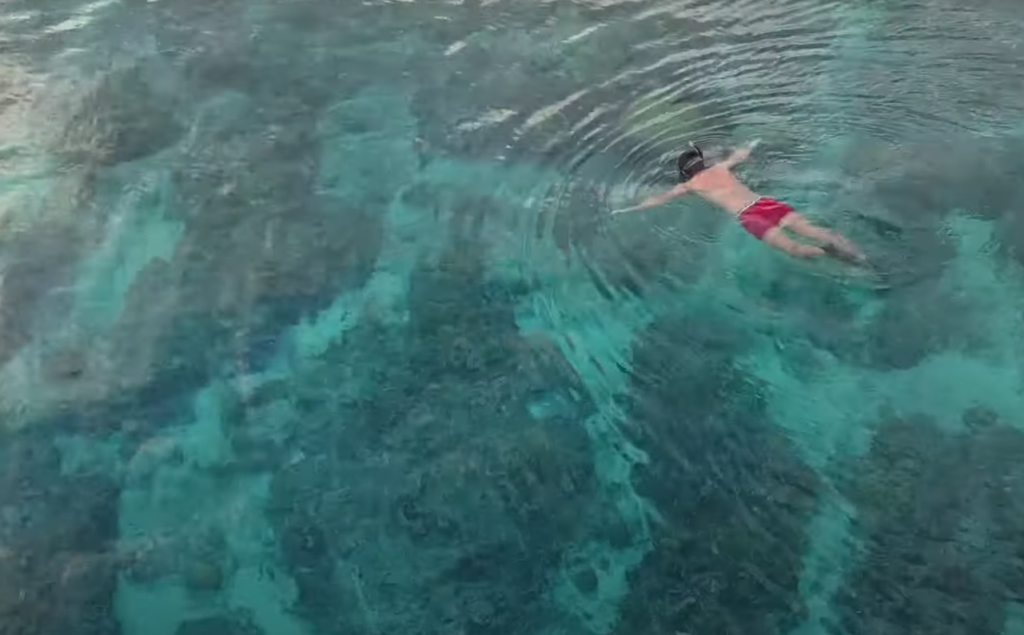
FAQ
Can you put Vaseline on a new tattoo to go swimming?
The short answer is no. Vaseline is a petroleum-based product, which means it can create a barrier between your skin and the water. It may even make it harder for the ink to stay put in your tattoo and could cause an infection if not properly removed afterward. Instead of putting Vaseline on a new tattoo before swimming, you should use a specialized waterproof tattoo cover-up or aftercare product.
Is it ok to go swimming with a new tattoo?
When can you swim in chlorine after a tattoo?
It is best to wait at least two weeks or follow your tattoo artist’s instructions before going into a swimming pool with chlorine. Even after this time, it is important to keep the tattoo covered when not in direct contact with water and make sure that you rinse off any chlorine residue as soon as possible after finishing your swim. To protect your tattoo from chlorine and other contaminants, you can also use a specialist waterproof product before entering the pool.
Will chlorine ruin my tattoo?
Chlorine can cause fading and discoloration of your tattoo, so it is important to take steps to protect your tattoo when swimming in a chlorinated pool. You should always keep the tattoo covered when not in direct contact with water and rinse off any chlorine residue after finishing your swim. It is also a good idea to use a specialist waterproof product before entering the pool to ensure your tattoo is fully protected and will remain vibrant for years to come.
Can I work out 3 days after the tattoo?
It is best to wait until your tattoo has had sufficient time to heal before you start any type of exercise or strenuous activity. Depending on the size and complexity of your tattoo, this could be anywhere from one week to a few weeks after getting it done. It is also important to take care not to pull or stretch the skin too much, and to avoid soaps and detergents that could irritate the healing skin around your tattoo.
Will sweating ruin a new tattoo?
Sweating alone will not ruin a new tattoo, but it is important to avoid any extra moisture that could irritate the healing skin. Take care not to pull or stretch the area too much when exercising, and make sure you protect your tattoo from strong sunlight as well as chlorine, dirt, and other contaminants. Keep the area clean with a perfume-free and dye-free soap, and apply a generous layer of moisturizer afterward to keep the area hydrated.
What not to do after a tattoo?
There are a few things you should avoid after getting a tattoo in order to ensure it heals properly and retains its vibrant color for years to come:
- You should avoid swimming, soaking in the area (eg: baths or hot tubs), and exposure to strong sunlight until your tattoo has had sufficient time to heal;
- You should also avoid any products that contain petroleum, alcohol, or fragrances that could irritate the healing skin;
- Finally, it is important to avoid scratching or picking at the area as this could lead to infection and poor healing;
Does sweat affect tattoos?
Sweat itself will not affect the color of your tattoo, but it is important to take care not to pull or stretch the area too much when exercising. Sweating can also cause extra moisture which could irritate the healing skin, so make sure you keep the area clean and moisturize afterward. Additionally, be sure to protect your tattoo from strong sunlight, chlorine, and other contaminants.
Do tattoos make you hotter?
Tattoos may not make you physically hotter, but they can certainly make you look hotter! Depending on the size and complexity of your tattoo, it could take anywhere from one week to a few weeks for the area to heal. Once it has healed, be sure to keep the area clean and moisturized to ensure its vibrancy is maintained for years to come. Additionally, it is important to protect your tattoo from strong sunlight, chlorine, dirt, and other contaminants when swimming or exercising.
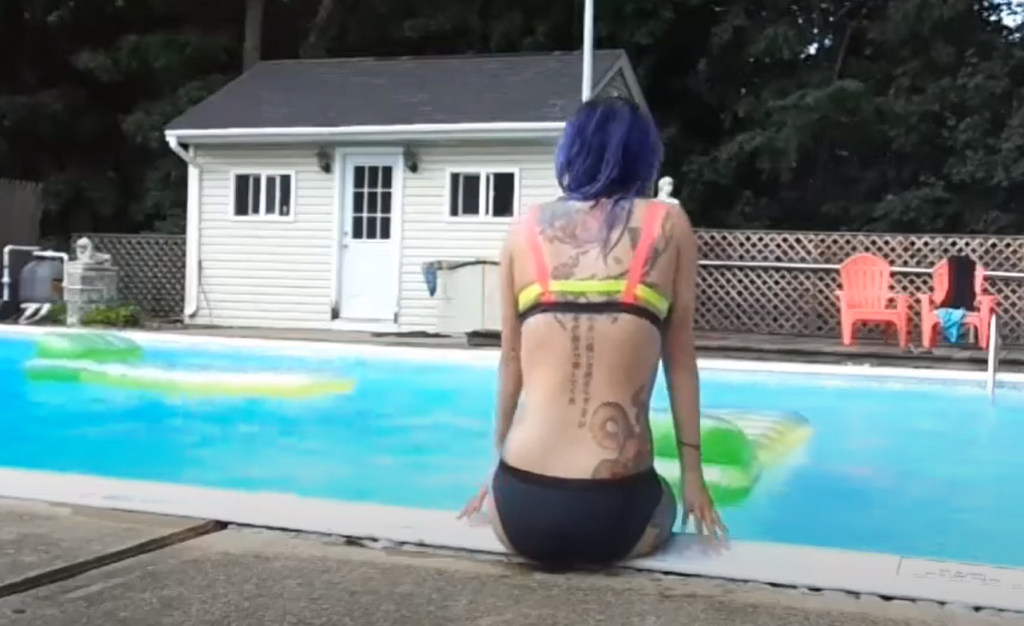
Can I work out 1 week after getting a tattoo?
It is best to wait until your tattoo has had sufficient time to heal before you start any type of exercise or strenuous activity. Depending on the size and complexity of your tattoo, this could be anywhere from one week to a few weeks after getting it done. If you are going to exercise, make sure you take care not to pull or stretch the skin too much, and to avoid soaps and detergents that could irritate the healing skin around your tattoo. Additionally, be sure to protect your tattoo from strong sunlight, chlorine, and other contaminants.
Why am I tired after getting a tattoo?
Getting a tattoo can be an exhausting process and often leaves you feeling drained afterward. This is because the body has to work hard to keep up with the demands of the procedure and heal the area afterward. Additionally, some people may feel lightheaded or faint during or after getting a tattoo due to the release of endorphins in response to the pain. It is important to rest after getting a tattoo to allow your body time to heal and recover.
Useful Video: Tattoo Aftercare Waterproof Bandage, Perfect for Larger Tattoos Also for Some Size Bandages
Conclusion
The best way to protect your swimming tattoo is by taking proper precautions to waterproof it. Before you take a plunge in the pool, make sure that you use a waterproof barrier cream for tattoos, such as A+D Ointment or Tattoo Goo. Additionally, ensure that your tattoo has healed properly and hasn’t been exposed to the sun or chlorine unless you’ve applied sunscreen, then rinse it immediately after swimming. Following these steps can help keep your swimming tattoo looking great for years to come.
We hope we’ve answered any questions you may have about how to properly waterproof a tattoo for swimming. Remember that tattoos are permanent, so taking proper care of your tattoo is essential. If you’re ever unsure about how to protect your swimming tattoo, don’t hesitate to contact a professional tattoo artist or dermatologist for the advice! Good luck with your swimming adventures!
References:
- https://www.healthline.com/health/body-modification/everything-you-need-to-know-about-swimming-with-fresh-ink#
- https://athleteapproved.com/how-to-waterproof-a-tattoo-for-swimming/
- https://waterprooftips.com/how-to-waterproof-a-tattoo-for-swimming/





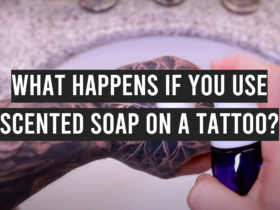


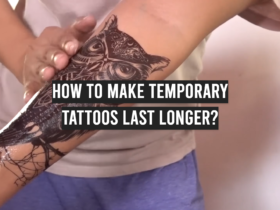

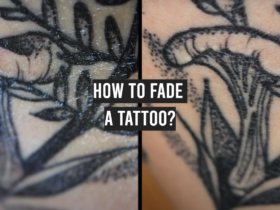
Leave a Review